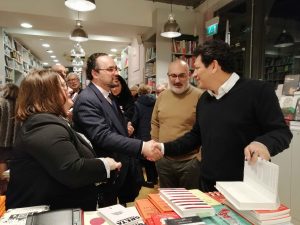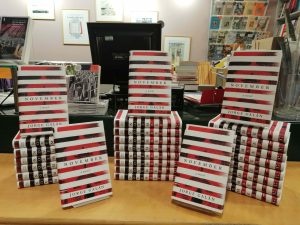‘November’ in London: Jorge Galán presents his novel at the LRB after 30 years of El Salvador’s massacre

Salvadoran writer and poet Jorge Galán presented the English translation of his novel November, published by Constable, at an event held at the acclaimed London Review Bookshop and organized with the support of the Instituto Cervantes in London. Galán’s book won the Royal Spanish Academy Award, one of the most prestigious in the language.
In the novel, Galán narrates the murder of six Spanish Jesuits and two Salvadoran women at the Catholic University of San Salvador. The year is 1989 and the Central American country lives mired in the horror of the civil war. A fateful early morning of November, a group of armed men entered the premises of the Catholic University and murdered eight people in cold blood.
In the days following the massacre, only Father Tojeira is determined and committed to discovering the murderers. The only witness who could help resolve the case is silenced by government authorities. November is an energetic and brave novel that investigates the tragic events that shocked El Salvador and Latin America.

Too much silence
“In El Salvador there is too much silence towards important stories. Everything is locked in silence, that’s why I wanted to bring these stories to the present,” explained Galán in the London bookstore. The writer said that when the events occurred there was not much information because there was no internet, hence the extra importance of telling what happened to future generations. There was what he describes as a war environment, in which people talked very little about what happened and the rest of the things that happened.
Galan regrets that his country does not have a culture of peace: “We live in a shady and cultural context, where crime is the daily bread. I feel a huge void in society. The Jesuits were an important part of society and we have not been able to fill it, ”added the writer.
Galán (San Salvador, 1973) is the author of several books of poems and the novel The Room at the Bottom of the House, which has been translated into several languages. He won the Ibero-American Prize for published work Jaime Sabines 2011, the Antonio Machado International Prize 2009, the Adonais Prize 2006 and the National Prize of El Salvador in both poetry and novel and children’s stories.

The writer is clear that with November his intention was not to write a religious novel. In that sense, it is clear that the murdered Jesuits could have been anywhere in the world, but they decided to stay in El Salvador, a country where there had been murders of priests since 1970, so consciously, they knew they were risking their lives . “Religious or not, it is impossible that this story does not provoke something, it is a real and human sacrifice. They decided to stay, and in the end, they lost their lives,” he said.
Exiled in Spain since 2015 for the threats received after publishing his novel, in December Galán plans to return to his country: “I am not afraid, I need to return, I cannot not return, it is impossible not to return. I don’t see myself not going to my country.”
During the audience’s question time, Galán explained that although his perception of what happened may be subjective and poetic, he believes that El Salvador is a place that has experienced a lot of violence and that can be perceived in many parts of the country.

Galán also remarked that November was written using the technique of the novel form because that was what he had in mind at first. “I do not consider it a testimony, although I use correct information and data, but I recreate the context and write for someone who is 22 to 25 years old in El Salvador to read it. And I thought the novel was the right thing, ”he said.
His intention was to reach all audiences, but at first, he decided to write about the murders because he realised that young people at UCA University did not know anything about what happened.


